Introduction
Research in our lab
focuses
on
the ecology and evolution of animal vocal behaviour and animal mating
strategies, with a focus on wild birds in the temperate zone and wild
birds, frogs, and mammals in the
tropics, and on bioacoustic approaches to studying the ecology and
conservation of wild animals. If you are interested
in studying these topics in our lab as a graduate student, please read
the
information on
this page and write to me to introduce yourself.
| A
note for undergraduate students: We have many opportunities for
undergraduate students on our research team, to study birds, frogs, and
whales under my supervision and the supervision of grad students and
postdocs on our team.
Possibilities include NSERC USRA, Oustanding Scholars, IGNITE, and
volunteer positions, If this interests you, please write to me to
introduce
yourself: dmennillATuwindsorDOTca. |
Project
Ideas
I encourage students
to
develop graduate thesis
projects that match their individual interests within the fields of
animal communication and avian bioacoustics. You may interact directly
with one
of our ongoing research
projects or you may develop your own project. All projects in our lab
involve both field-based and lab-based research components. In Canada,
field research is possible in the vicinity of
University of Windsor's campus around the Great Lakes, at
Queen's University Biological Station in eastern Ontario, or at Bowdoin
Scientific Research Station in New Brunswick. In Costa Rica, field
research is
possible in Sector Santa Rosa of the
Guanacaste
Conservation Area. Presently, we
have ongoing field projects in Canada on the behavioural
ecology and communication strategies and mating strategies of songbirds
including Black-capped Chickadees and Savannah Sparrows. In
Costa Rica, we are presently studying the behaviour and ecology of
non-migratory, territorial birds, with a special focus on the duetting
behaviour of neotropical birds. We am also interested in the vocal
behaviour of mammals and anurans. You can learn more
about our current research projects by visiting my publications
page.
Our lab is equipped with advanced equipment for field
studies of animal behaviour and communication. In our lab
you can develop a research project using digital recording equipment
(for both automated recording and focal recording),
interactive playback equipment, multi-speaker playback equipment,
multi-channel array recording equipment (for both wired and wireless
microphone arrays), and high precision GPS
equipment. Our lab is an international leader in the development of new
technologies for studying acoustic communication in wild animals, and
you can expect to develop expertise with state-of-the-art techniques in
this area. The lab component of your
research can involve computer-based analyses of single-channel and
multi-channel field recordings. The Mennill Sound Analysis Lab houses
over 250 TB of drive space containing more than a decade of archived
digital recordings from around the world. In
collaboration with my colleagues, you can also have access to advanced
facilities for laboratory analyses including
molecular paternity analyses, analyses of genetic relatedness,
molecular sex
assignment, and hormone analyses. The University of Michigan Vertebrate
Museum is only a short drive away in Ann Arbor, Michigan, so that
projects that focus on museum-based studies are also possible.
What
to expect in the Mennill Lab
Our lab is a dynamic,
diverse, and
interactive place. You can
expect to interact with me and with the other graduate students,
undergraduate students, and postdocs in the lab on a
frequent basis. You can expect to develop skills in data
analysis and data presentation. I will encourage you and assist
you in preparing your research for publication in scientific
journals. I will also encourage you to present the results of
your research at scientific meetings. I expect
you to work hard and to approach your studies with a critical eye and a
creative state of mind. We often meet socially on Friday afternoons and
we have several lab social events every semester, often involving a
birdwatching expedition with a visiting guest speaker. Many
more social activities are organized by the Department of Biology
Graduate Students Association ( DBGSA).
Funding
Funding for graduate
studies in our lab is available through a variety
of
sources. As with all graduate students at the University of Windsor,
students in our lab are guaranteed a competitive funding package upon
admission to the graduate school. Funding comes in the form
of Graduate Teaching Assistantships (September to April of each year)
and Research Assistantships from my grants (May to August of each
year). Funding can be supplemented through
scholarships that you apply for. I
encourage you to apply for scholarships from NSERC (link: www.nserc.ca, go to "Information for
Students and Fellows") and from OGS (link: osap.gov.on.ca).
If you are not familiar with these programs, I can help you learn about
the application process. Details about grad student support, as well as
other information about my department, can be found at www.uwindsor.ca/biology (click on
the Grad Students link along the left-hand side and choose Biological
Sciences Graduate Studies). I encourage all of my students to apply to
the many
granting agencies who support graduate student research (see BirdNet
for a
comprehensive list of all grants available).
University
of Windsor
The University of Windsor
is an research university in
southern
Ontario. Historically recognized for a strong teaching program, the
University has recently developed a research portfolio in
the areas of ecology and evolution. The Ecology Evolution Environment
and Behaviour (EEEB) group
is comprised of a diverse group of research scientists that are some of
the most outstanding research-oriented biologists in Canada.
We bring in a wide
variety of
guest speakers to the
University of Windsor through the Departmental Seminar Series and
through the Behaviour Cognition and Neuroscience Seminar Series.
In the recent past we have hosted very stimulating visits from Dr.
Albrecht
Schulte-Hostedde, Dr. Peter Dunn, Dr. Linda Whittingham, Dr. Jordan
Price, Dr. John Klicka, Dr. Ryan Norris, Dr. Jeff Podos, Dr. David
Lahti, Dr. Beth MacDougall-Shackleton, Dr. Nigel
Mann, Dr. Paul Martin, Dr. Ben Evans, Dr. Angelika
Poesel, Dr. Geoff Hill, Dr. Gail Patricelli, Dr. Chris Sturdy, Dr. Jim
Quinn, Dr. John Burt, and Dr. Michael Kasumovic.
The city of Windsor is a
good place to live and study. It
is an underrated city which hosts an impressive diversity of
restaurants, pubs, hiking
trails, lakes, and rivers. Bird
watching
around Windsor is excellent in all seasons, but especially during
migration. Point Pelee and Holiday
Beach are two of
the world's finest spots for watching bird migration, and they're both
just a short drive away. Many graduate students in our laboratory
volunteer with the Holiday Beach Migration Observatory, and have
expanded their mist netting skills each fall while assisting with local
migration monitoring efforts.
Contact
Me
If you are interested in
graduate work in
my lab, please contact me to
introduce yourself (dmennillATuwindsorDOTca). Please include your
CV and a brief explanation of your
research interests. Please note that I often recruit students in
November, December, and January to start in the field the subsequent
spring, although I am always willing to interact with interested
students.
Note to non-Canadians:
Tuition at University of Windsor is expensive for non-Canadians.
The Canadian Government and
University of Windsor does
offer a very limited number of scholarships for non-Canadians who
have strong track records (e.g. several published papers, high grades,
and experience as a biologist) and I would be happy to communicate with
you about these scholarships if this applies to you. Otherwise, it is
quite difficult for me to take on non-Canadians unless they have
independent
funding. I hope that this situation might change in the future.
|
|
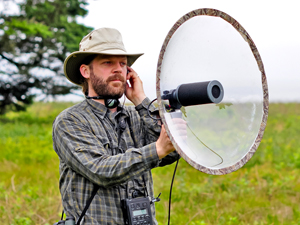
Dan
recording a Savannah Sparrow.

Recording
animal communication networks using a 16-channel acoustic
location system.
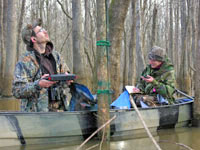
Setting up automated listening stations to conduct long-term remote
monitoring.

Multi-speaker playback for simulating interactions between multiple
birds.
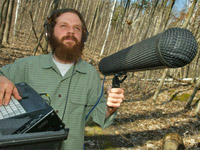
Iinteractive playback for engaging territorial birds in realistic
interactions.
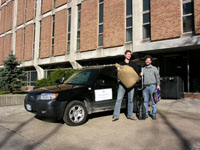
The Biology Building at the University of Windsor and the
Mennill/Norris Lab
Subaru.
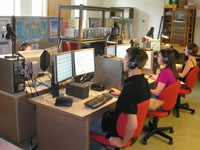
The Mennill Sound Analysis Laboratory.
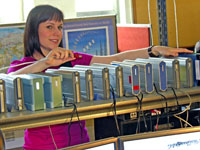
Capacity for storage of over 150 terrabytes of digital sound recordings.
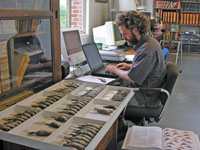
Study
museum specimens at the nearby University of Michigan vertebrate museum.
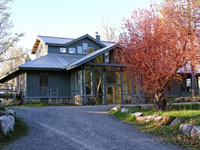
Field research site: Ontario at Queen's University Biological Station
(QUBS).
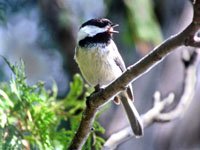
A black-capped chickadee at QUBS.
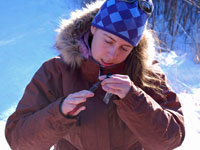
Winter field research banding chickadees at QUBS.
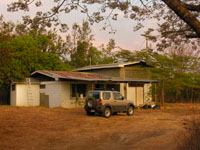
Field research site: The Mennill/Doucet research house in Costa Rica.
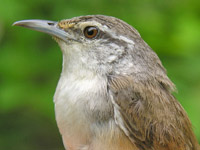
A duetting Thryothorus wren in Costa Rica.
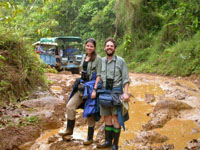
Adventuresome field research in Canada or the tropics. |